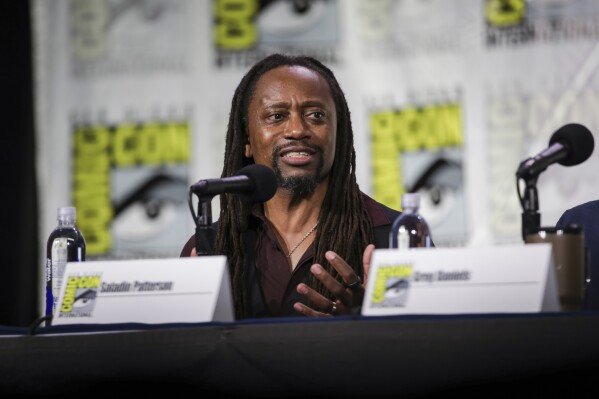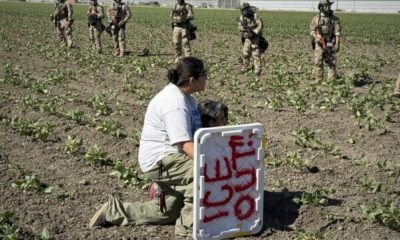Top Stories
Hank Hill returns to a changed world in new ‘King of the Hill’ episodes

NEW YORK (AP) — Hank Hill is back and he’s the same ol’ Hank Hill, but a lot of things around him have changed.
The lovable animated hero of “King of the Hill” has returned from a 15-year lull and he isn’t sure what boba tea is, how ridesharing works and is confused by all-gender bathrooms. “What kind of food is poke?” he asks his wife, Peggy.
Hank and Peggy have returned to their hometown of Arlen, Texas — and our TV sets — but a lot has happened over the years and they’re stepping into a world they don’t always recognize.
“Hank, have things changed here more than we thought?” Peggy asks, worried, in the first new episode. “Did we make a mistake coming back?”
Hulu is definitely hoping not, reuniting many of the same writers and voice cast who turned the propane-loving, beer-sipping Hill into one of TV’s few blue-collar icons. The first 10 episodes hit Hulu on Monday.
A new ‘King of the Hill’ leader
Saladin K. Patterson, the executive producer and showrunner for the new season 14, hopes the original fans will return to see how Hill copes in the modern day.
“That’s always key because you want that core fan base to validate what you’ve done because they’re like the gatekeepers in a way,” he says. “So when they sign off and say, ‘OK, they didn’t mess it up, it’s still the same special show,’ I think other people who may be unfamiliar with it, or even on the fence, feel like, ‘OK, well, now we want to like it.’”
Viewers will learn that Hank and Peggy have been in Saudi Arabia all this time, where he served as “assistant manager in charge of Arabian propane and Arabian propane accessories.” Their son Bobby, now 21, is the chef of a “down home, German-Asian fusion” restaurant. (Sample dish: Grilled mackerel with a side of mustard pretzel.)
Hank and Peggy have retired and he happily rejoins his line of friends drinking cans of beer in an alley. Boomhauer gives him a hug and Dale has grown even more paranoid, becoming “an election-denier-denier.”
Bill has let himself go, staying indoors and living off Amazon deliveries. “I finished Netflix, Hank. Did you know that when you get to the end of Netflix, you get something called ‘a wellness check?’” Viewers in the second episode hear Tom Petty’s “Runnin’ Down a Dream,” a nice nod to the late rocker’s embrace of the show when it first appeared.
“The writers have found that balance between the vintage ‘King of the Hill’ that we adore and the new — and letting them coexist,” says Pamela Adlon, who voices Bobby.
Same gentle tone
Creators Mike Judge, the mastermind behind “Beavis and Butt-Head,” and Greg Daniels, who would go on to co-create “The Office,” helped Patterson navigate this world, which they sheparded during its first 13 seasons, airing from 1997 to 2009.
The show’s tone maintains its gentle mocking of modern life, from hipsters and their craft ales to bike lanes. Hill at one point shakes his head over modern outdoor grills having sensors and app connections: “I shouldn’t have to call technical support to make a burger.”
Patterson says the humor is grounded in real life. “I do have a barbecue grill that is Wi-Fi- and Bluetooth-enabled. I have three devices to run it, but I’m calling tech support because I have guests coming over and the meat needs to be done,” he says. “And I do think over the pandemic, my wife finished Netflix.”
While there are changes, some things are immutable. “Hank’s still going to drink beer. Dale’s still going to be a conspiracy theorist. Bill’s still going to be a lovable sad sack,” says Patterson. “Those core character things had to be the same. I had a pastor who told me one time, ‘Grown folks don’t change.’”
Viewers will see in upcoming episodes if Hank — a happy propane seller and garage tinkerer — can really ever retire and watch as Hank’s friends navigate new chapters. They’ll also explore the relationship between an adult Bobby and his parents.
“He’s of age now and it’s really kind of cool because you see the similarities and all the attributes that he took from his parents that he wasn’t even aware of when he was a boy — or didn’t want to have anything to do with — and now he’s using them to keep his business going and move himself forward,” says Adlon.
A politics-free zone
While debates have raged over where Hank Hill sits on the political spectrum, his creators argue he represents a sensible, common-sense middle. He follows the rules and does the best he can without hurting anyone.
“It’s so not a Republican or a Democratic show or an independent show. It’s all of that,” says Adlon. “There’s space in the world for everybody. It’s hard for us all to find a safe space in a common area anymore and that’s what this show really is.”
And even though the new “King of the Hill” episodes arrive during President Donald Trump’s second term, don’t expect any politics from Hank Hill.
“We want to tell relatable stories where people can see themselves in our characters or their family members in our characters,” says Patterson.
“There are enough cultural things and relationship things that have shifted to where he can comment on that without us wading into tariffs and immigration policy and stuff like that.”
Top Stories
Trump National Guard California Newsom

The National Guard, police and protesters stand off outside of a downtown jail in Los Angeles following two days of clashes with police during a series of immigration raids on June 08, 2025 in Los Angeles, California.
Spencer Platt | Getty Images
A federal judge on Tuesday barred President Donald Trump from deploying National Guard and other military troops in California to execute law-enforcement actions there, including making arrests, searching locations, and crowd control.
The ruling came in connection with a lawsuit filed in early June by the state of California challenging Trump’s and Defense Secretary Pete Hegseth’s deployment of the Guard to deal with protests in Los Angeles over the Trump administration’s immigration enforcement policies.
Judge Charles Breyer said that Trump’s deployment of thousands of National Guard troops and 700 Marines to L.A. violated the federal Posse Comitatus Act, which bars U.S. Military forces from enforcing the law domestically.
Breyer’s ruling in U.S. District Court in San Francisco is limited to California, and the judge stayed the decision until Sept. 12 to give the Trump administration time to appeal it.
But it comes as Trump has considered deploying National Guard troops to other U.S. cities to deal with crime, including Oakland and San Francisco.
Breyer warned that it would create “a national police force with the President as its chief.”
Gov. Gavin Newsom gloated about the ruling in a social media post.
“DONALD TRUMP LOSES AGAIN,” Newsom wrote on X.
“The courts agree — his militarization of our streets and use of the military against US citizens is ILLEGAL.”
Breyer, in his ruling,g wrote, “Congress spoke clearly in 1878 when it passed the Posse Comitatus Act, prohibiting the use of the U.S. military to execute domestic law.”
“Nearly 140 years later, Defendants — President Trump, Secretary of Defense Hegseth, and the Department of Defense — deployed the National Guard and Marines to Los Angeles, ostensibly to quell a rebellion and ensure that federal immigration law was enforced,” the judge wrote.
“There were indeed protests in Los Angeles, and some individuals engaged in violence,” Breyer wrote.
“Yet there was no rebellion, nor was civilian law enforcement unable to respond to the protests and enforce the law.”
Breyer said that evidence introduced during a trial for the lawsuit shows that the defendants had “systematically used armed soldiers (whose identity was often obscured by protective armor) and military vehicles to set up protective perimeters and traffic blockades, engage in crowd control, and otherwise demonstrate a military presence in and around Los Angeles.”
CNBC has requested comment on the ruling from the Justice Department, which represented the Trump administration in the lawsuit.
This is breaking news. Please refresh for updates.
Top Stories
University of Kentucky athlete charged after dead infant found hidden in closet | US crime

A University of Kentucky athlete allegedly placed her dead infant inside a trash bag later found in a closet while trying to hide the baby’s birth, leading to her being jailed, according to local authorities and media reporting.
Laken Ashlee Snelling, 21, faces charges of corpse abuse, tampering with physical evidence and concealing the birth of an infant after her arrest on Sunday in the markedly grisly case, police in Lexington, Kentucky, said in a statement.
Snelling had been a member of the University of Kentucky’s competitive cheer stunt squad for the past three seasons, the school told the local news station WLEX in a statement. Her arrest citation, which was obtained and reviewed by WLEX, says police were called out to Snelling’s home on 27 August to investigate a report of “a deceased infant being located inside … a closet”.
The baby was “wrapped in a towel inside … a black trash trash bag”, prompting police to read Snelling her Miranda rights as well as interrogate her, the citation said. The citation added that Snelling admitted to investigators that she had given birth to the child and then tried to conceal that by “cleaning any evidence, placing all cleaning items used inside of a black trash bag, including the infant”.
Lexington police said that the local coroner’s office would conduct an autopsy on the infant and later release information about the baby’s cause of death.
Snelling was scheduled to make a preliminary court appearance on Tuesday, two days after her arrest, according to public records.
Details about whether a bond was set for her – or its amount – were not immediately available. Snelling no longer appeared to be in the custody of Lexington’s jail by Tuesday morning.
The more serious charges against Snelling are corpse abuse and tampering with physical evidence. Under Kentucky state law, both are considered class D felonies, meaning people convicted of those crimes in particular could receive between one and five years in prison as well as a fine of up to $10,000.
Top Stories
Kraft Heinz is splitting up, separating hot dogs from ketchup : NPR

Kraft Foods and Heinz merged into one company in 2015.
Gene J. Puskar/AP
hide caption
toggle caption
Gene J. Puskar/AP
Hot dogs go to the left; ketchup to the right. That’s Kraft Heinz, one of the world’s largest food conglomerates, splitting into two companies.
The breakup comes a decade after its messy mega-merger, orchestrated by billionaire investor Warren Buffett and considered one of his notable missteps. In recent weeks, both Kraft Heinz and Buffett’s Berkshire Hathaway took multibillion-dollar impairment charges reflecting the declining value of the food giant.
Kraft Heinz spent years slicing its costs while rivals invested in new ideas to keep up with changing consumer tastes. Budget-conscious shoppers have been buying more store-brand packaged foods, while people willing to spend extra often reach for fresher alternatives to processed products.
Now, Kraft Heinz executives hope the sum of two separate companies will be greater than the firm’s current value.
The first will focus on shelf-stable foods and include brands Heinz, Philadelphia and Kraft Mac & Cheese. The second will include more of what the company describes as groceries, with brands such as Oscar Mayer, Maxwell House, Capri Sun and Lunchables. The latter will be run by Kraft Heinz’ current CEO, Carlos Abrams-Rivera.
The merger went sour
Kraft Foods and H.J. Heinz merged in 2015 in a mega-deal led by the firms that controlled Heinz: Buffett’s Berkshire Hathaway and Brazilian private-equity firm 3G Capital.
3G was famous for its cost-cutting approach to consumer companies, having reinvigorated Burger King and beverage giant Anheuser-Busch. But the strategy failed to feed much growth at Kraft Heinz.
In 2019, after massive layoffs and lost sales, the company shocked Wall Street by writing down the value of marquee brands Oscar Mayer and Kraft by $15 billion. It faced shareholder lawsuits and an investigation by U.S. financial regulators.
In July, Kraft Heinz once again reported a drop in sales and a net loss of nearly $8 billion, largely thanks to a $9.3 billion impairment charge attributed to the declining share price. Soon after, Berkshire Hathaway also wrote down the value of its investment in Kraft Heinz with its own $3.8 billion impairment charge.
Buffett had maintained his financial stake even as 3G Capital completed its quiet exit from Kraft Heinz last year. In a rare admission, Buffett did acknowledge he “was wrong in a couple of ways on Kraft Heinz” and had overpaid in the deal, but praised the historic strength of the brands.
History is a who’s-who of food brands
Pittsburgh-based Heinz began in 1869 with grated horseradish that Henry J. Heinz packaged in a clear jar to show off its quality. But of course it was his ketchup – or “catsup” as it was known for a while – that brought Heinz fame, followed by baked beans.
Illinois-based Kraft brothers started their business selling cheese by horse and wagon in the early 1900s. During World War I, they supplied the U.S. Army with cheese processed to resist spoilage.
The Great Depression saw Kraft introducing the mayo-like Miracle Whip and the iconic mac and cheese mix, one of the first pre-packaged, shelf-stable dinners. The Kraft brothers also acquired Philadelphia – the cream cheese – and Velveeta. And in 1935, hot liquid cheese poured onto cold stainless steel and cut into squares set the stage for Kraft Singles cheese slices.
In the 1980s, Kraft was bought by tobacco giant Philip Morris during a food-company buying spree. That’s when Kraft ballooned to include Nabisco, Jell-O, Maxwell House and hot-dog maker Oscar Mayer.
In the early 2000s, Kraft again became its own publicly traded company. Later it spun off a separate snacking company, Mondelez, which makes Oreo cookies and Ritz crackers.
The big food meltdown
After its 2015 merger, Kraft Heinz wanted to jump-start growth by buying rival Unilever, maker of Hellmann’s mayonnaise and Ben & Jerry’s ice cream. But the European conglomerate rejected the deal.
Kraft Heinz tried to refresh its food offerings and address families’ growing health concerns. It cut the sugar level in its Capri Sun juices. It launched cheese-stuffed hot dogs, hot honey and plant-based cheese and mayo. It began making mac and cheese with natural food coloring. Last year, after reports about Lunchables’ sodium and heavy metals content, the company stopped offering the snack packs for school-lunch programs. It is now removing artificial food dyes from all U.S. products.
But years of high inflation have shoppers at Walmart, Costco and supermarket chains increasingly choosing private-label packaged foods, including in categories where brand names had long enjoyed high loyalty. And smaller startups continue to pose fierce competition with new takes on familiar snacks and meals.
In February, CEO Abrams-Rivera said Kraft Heinz was focusing its resources on faster-growing and more profitable products “to become a sauces and meals powerhouse.”
By mid-2025, the company’s shares lost two-thirds of their value from the post-merger peak. The company’s stock rose Tuesday on the news of the breakup.
-

 Business4 days ago
Business4 days agoThe Guardian view on Trump and the Fed: independence is no substitute for accountability | Editorial
-
Tools & Platforms3 weeks ago
Building Trust in Military AI Starts with Opening the Black Box – War on the Rocks
-

 Ethics & Policy1 month ago
Ethics & Policy1 month agoSDAIA Supports Saudi Arabia’s Leadership in Shaping Global AI Ethics, Policy, and Research – وكالة الأنباء السعودية
-

 Events & Conferences3 months ago
Events & Conferences3 months agoJourney to 1000 models: Scaling Instagram’s recommendation system
-

 Jobs & Careers2 months ago
Jobs & Careers2 months agoMumbai-based Perplexity Alternative Has 60k+ Users Without Funding
-

 Funding & Business2 months ago
Funding & Business2 months agoKayak and Expedia race to build AI travel agents that turn social posts into itineraries
-

 Education2 months ago
Education2 months agoVEX Robotics launches AI-powered classroom robotics system
-

 Podcasts & Talks2 months ago
Podcasts & Talks2 months agoHappy 4th of July! 🎆 Made with Veo 3 in Gemini
-

 Education2 months ago
Education2 months agoAERDF highlights the latest PreK-12 discoveries and inventions
-

 Mergers & Acquisitions2 months ago
Mergers & Acquisitions2 months agoDonald Trump suggests US government review subsidies to Elon Musk’s companies






















